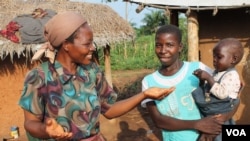The United Nations refugee agency says authorities in the Democratic Republic of Congo have suddenly closed a camp for internally displaced people, forcing them to leave and go home.
The U.N. refugee agency says 2,300 people living in the Kiwanja IDP camp, in the eastern Congolese city of Rutshuru, have suddenly become homeless. It says people were forced to leave the camp on December 2 without warning and told to go home.
UNHCR spokesman William Spindler says his agency is greatly concerned about the people who were suddenly set adrift.
“Within a day, all had been forced to leave the site and their makeshift shelters were burnt to the ground. Many of the IDPs do not have homes to go back to and are worried that they will not be safe in their villages. In addition, many IDPs had planted crops and would like to harvest these before leaving," said Spindler.
Many displaced people living in IDP sites around Goma, the capital of North Kivu province, have voluntarily returned home since the DRC government defeated rebel group M23 in fighting last year.
The UNHCR says it recognizes such voluntary returns as long as they are in compliance with international humanitarian and human rights law.
However, the agency says the sudden closing of the camp in Kiwanja does not fit that category. It notes the DRC ratified an African Union treaty on the protection and assistance of internally displaced people in July.
A UNHCR spokeswoman, Karin de Gruijl, tells VOA that regional authorities decided they would close the IDP camp because the improved security situation meant people could go home without risk.
“The M23 rebels, which were the main reason that these people were displaced about a year-and-a-half, two years ago, they have been brought back under control, so that is the argument of telling these people to go back. Our concern is that there are other militia groups in the area as well and there is still lawlessness and banditry, sexual violence against women — meaning that one of the militias has been brought back under control to a certain extent, does not mean it is safe for people to go back," said de Gruijl.
The UNHCR says certain measures must be taken to help IDPs who are unwilling or unable to return to their villages of origin because of insecurity.
The measures it recommends include providing livelihood opportunities in places where people are displaced. It says other solutions, such as local integration near the sites also should be considered.
The agency says ongoing conflicts in North Kivu have caused nearly 900,000 people to flee their homes. It says more than 200,000 of them are living in 60 sites.










